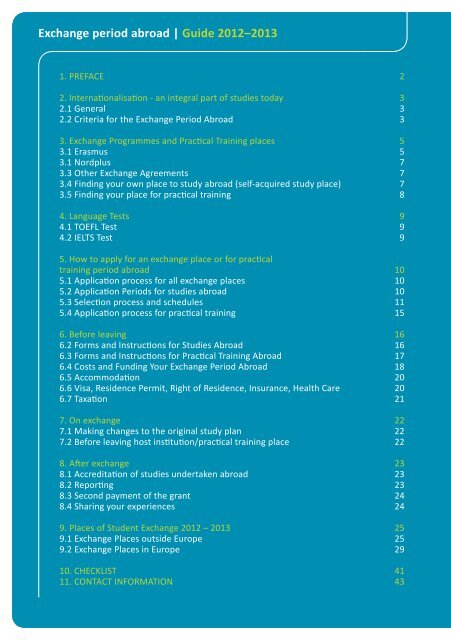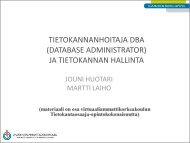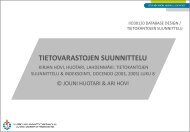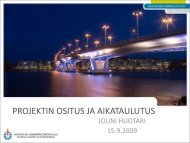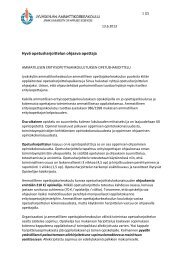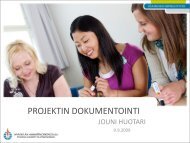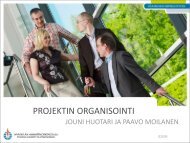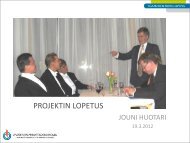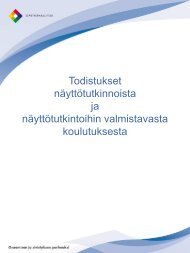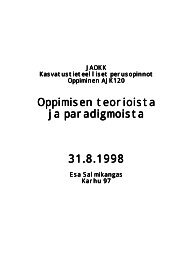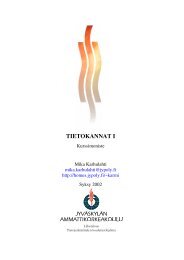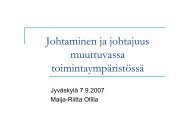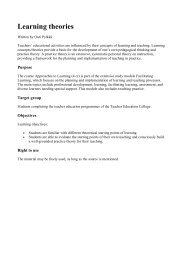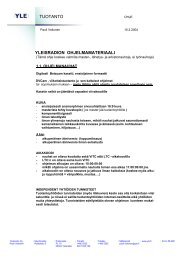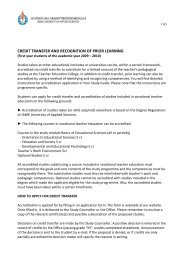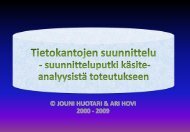Exchange period abroad | Guide 2012–2013
Exchange period abroad | Guide 2012–2013
Exchange period abroad | Guide 2012–2013
Create successful ePaper yourself
Turn your PDF publications into a flip-book with our unique Google optimized e-Paper software.
<strong>Exchange</strong> <strong>period</strong> <strong>abroad</strong> | <strong>Guide</strong> <strong>2012–2013</strong><br />
1. PREFACE 2<br />
2. Internationalisation - an integral part of studies today 3<br />
2.1 General 3<br />
2.2 Criteria for the <strong>Exchange</strong> Period Abroad 3<br />
3. <strong>Exchange</strong> Programmes and Practical Training places 5<br />
3.1 Erasmus 5<br />
3.1 Nordplus 7<br />
3.3 Other <strong>Exchange</strong> Agreements 7<br />
3.4 Finding your own place to study <strong>abroad</strong> (self-acquired study place) 7<br />
3.5 Finding your place for practical training 8<br />
4. Language Tests 9<br />
4.1 TOEFL Test 9<br />
4.2 IELTS Test 9<br />
5. How to apply for an exchange place or for practical<br />
training <strong>period</strong> <strong>abroad</strong> 10<br />
5.1 Application process for all exchange places 10<br />
5.2 Application Periods for studies <strong>abroad</strong> 10<br />
5.3 Selection process and schedules 11<br />
5.4 Application process for practical training 15<br />
6. Before leaving 16<br />
6.2 Forms and Instructions for Studies Abroad 16<br />
6.3 Forms and Instructions for Practical Training Abroad 17<br />
6.4 Costs and Funding Your <strong>Exchange</strong> Period Abroad 18<br />
6.5 Accommodation 20<br />
6.6 Visa, Residence Permit, Right of Residence, Insurance, Health Care 20<br />
6.7 Taxation 21<br />
7. On exchange 22<br />
7.1 Making changes to the original study plan 22<br />
7.2 Before leaving host institution/practical training place 22<br />
8. After exchange 23<br />
8.1 Accreditation of studies undertaken <strong>abroad</strong> 23<br />
8.2 Reporting 23<br />
8.3 Second payment of the grant 24<br />
8.4 Sharing your experiences 24<br />
9. Places of Student <strong>Exchange</strong> 2012 – 2013 25<br />
9.1 <strong>Exchange</strong> Places outside Europe 25<br />
9.2 <strong>Exchange</strong> Places in Europe 29<br />
10. CHECKLIST 41<br />
11. CONTACT INFORMATION 43
1. Preface<br />
This guide is meant for the students of JAMK University of Applied Sciences (JAMK) who are<br />
interested in an exchange <strong>period</strong> or practical training <strong>period</strong> <strong>abroad</strong>. It contains information<br />
on the application procedures, as well as exchange places for studies that are available at the<br />
Schools of JAMK. JAMK participates in the Erasmus <strong>Exchange</strong> Programme of the European<br />
Union (EU) and in the Nordplus Programme operating in the Nordic countries. In addition,<br />
each School has mutual exchange agreements with higher education institutions all over the<br />
world.<br />
The general rule is that you should apply for an exchange place only after you have successfully<br />
completed your basic studies or your first year of study. You should also have sufficient<br />
language, social and cultural skills. JAMK offers excellent opportunities to improve your<br />
language skills or to acquire “survival” level in the target language if you are going to study in<br />
English in a non-English -speaking country. We have compiled criteria that you should meet in<br />
order to be selected for an exchange.<br />
We hope this guide will give you a clear picture of the possibilities and the general info that<br />
you need at the beginning of your international journey. More information can be found in the<br />
student portal Optima – Study forum – Internationality through studies – Studying <strong>abroad</strong> –<br />
Before you leave (https://optima.jamk.fi/). Our International Relations Secretary will be happy<br />
to help you with any questions concerning the collective matters of the international affairs at<br />
international@jamk.fi. The International Coordinators of the Schools continue to serve in the<br />
matters concerning the international affairs of their schools.<br />
Start looking for information about the various possibilities available! An exchange semester<br />
or year <strong>abroad</strong> is a rewarding experience, giving you new challenges for your studies and your<br />
life. Take advantage of the opportunity!<br />
Publisher: JAMK University of Applied Sciences, International Services<br />
‘This project has been funded with support from the European Commission. This publication reflects the<br />
views only of the author, and the Commission cannot be held responsible for any use which may be made<br />
of the information contained therein.’<br />
2
2. Internationalisation<br />
– an integral part of studies today<br />
2.1 General<br />
The European integration has promoted and speeded up the internationalisation process<br />
of European higher education institutions. JAMK University of Applied Sciences (JAMK) is<br />
no exception. JAMK is an international higher education institution which educates future<br />
professionals well prepared for international challenges. More and more students take the<br />
opportunity to complete a part of their studies and improve their language and cultural skills<br />
<strong>abroad</strong>. For some students, exchange <strong>period</strong> <strong>abroad</strong> is a mandatory part of their studies.<br />
Internationalisation is an integral part of JAMK’s strategy, and it is also defined in the<br />
JAMK’s mission and vision. JAMK’s mission, ”JAMK University of Applied Sciences will be an<br />
internationally oriented forerunner in education and a strong player in practically oriented<br />
research, development and innovation activities”. “JAMK University of Applied Sciences wants<br />
to be the best university of applied sciences in Finland, with a strong track record in quality<br />
of education, internationalisation and promotion of entrepreneurship.” International student<br />
and staff mobility is one way to realize our vision and mission.<br />
Student exchange and practical training is an easy, economical and effective way to obtain<br />
international experience. If you are eligible for a Finnish government study grant and housing<br />
subsidy, these benefits also apply to your stay <strong>abroad</strong>. Funding is also available to non-Finnish<br />
students through exchange programmes, such as Erasmus and Nordplus. JAMK has funds<br />
to support student exchange and practical training as well. The amount of financial support<br />
available to the students of our institution is the same regardless of the type of support<br />
(Erasmus, Financial Support of the School), exceptions: FIRST, North-South-South and Nordplus<br />
programmes. We try to offer financial support also to the students who find the exchange<br />
place independently.<br />
Even if there is quite a lot of help and support available, going <strong>abroad</strong> demands initiative from<br />
you. Designing your studies or practical training and collecting information also takes a lot of<br />
time and patience. It is therefore sensible to start the process, and especially language training<br />
early enough.<br />
2.2 Criteria for the <strong>Exchange</strong> Period Abroad<br />
Every student who is enrolled at JAMK as a degree student (a Teacher Education College student<br />
as well) has a right to apply for an exchange place <strong>abroad</strong>. One of the basic prerequisites to be<br />
accepted for an exchange is that the courses you are going to take <strong>abroad</strong> can be accepted as<br />
a part of your degree. The study plan has to contain the same amount of studies as you would<br />
take during the same <strong>period</strong> of time at JAMK which means 5 credits per month, 30 credits per<br />
semester and 60 per academic year. After coming back from the exchange <strong>period</strong> you have to<br />
have your studies accredited.<br />
3
In addition to the basic prerequisites the following criteria is taken into consideration in the<br />
selection:<br />
1) <strong>Exchange</strong> <strong>period</strong> should take place after the first year of study at the earliest (Teacher<br />
Education being an exception)<br />
If you are taking Bachelor’s Degree you can go on exchange after the first year of studies at<br />
the earliest. If you are taking Master’s Degree you have to have taken studies at least for one<br />
semester before going on exchange.<br />
2) Studies have proceeded according to the personal study plan<br />
Studies you take <strong>abroad</strong> have to be part of the degree taken at JAMK time and content wise<br />
and must not extend your time of study. Your prior success in studies as well as the relevance<br />
to the degree taken is considered in the selection.<br />
3) Application documents<br />
Electronic application form and Learning Agreement need to be properly filled in and accepted.<br />
If needed, the application documents of the receiving institution must be filled in as well. See<br />
chapter 5 for further information.<br />
4) Language and communication skills<br />
It is important that you know the language of the country you are going to in order to cope<br />
with your studies, in every day as well as in working life situations. You should have taken<br />
at least two courses in the language of the future studies and proven your language skills<br />
before the exchange. Swedish is spoken in Nordplus exchanges. It is worth applying for an<br />
Erasmus Intensive Language Course (EILC) if you are going to a country with a less widely used<br />
language, see information in chapter 3.1.1<br />
5) Personal and social aptitude<br />
Every student studying <strong>abroad</strong> is a representative of JAMK as well as of Jyväskylä and Finland.<br />
The desirable characteristics those applying to study <strong>abroad</strong> should have:<br />
• Independence, initiative and good social skills<br />
• Ability to cope with unpredictable situations<br />
• Tolerance of dissimilarities<br />
• Cooperation and adaptability<br />
• Flexibility and openness<br />
• Commitment<br />
• Interest in international environment<br />
6) The ones going on exchange for the first time are chosen primarily<br />
Because our goal is to offer an opportunity to study or do practical training <strong>abroad</strong> to as many<br />
students as possible, JAMK grants finances primarily for one exchange place an academic<br />
year per student. For the same reason the prior exchanges of the student can be taken into<br />
consideration when students are selected.<br />
7) The Schools of JAMK may also have recommendations of their own<br />
8) Note! The institution of exchange makes the final decision on accepting the student<br />
4
3. <strong>Exchange</strong> Programmes and<br />
Practical Training places<br />
3.1 Erasmus<br />
Erasmus is an EU funded European exchange programme that started at JAMK in 1995, offering<br />
exchange opportunities for all our students. The Erasmus programme contains a wide range<br />
of measures designed to support the European activities of higher education institutions,<br />
including mobility and exchange of students and trainees as well as staff within the EU. In<br />
addition to the 27 Member States of the European Union, the programme is also open to<br />
participation by the four EEA countries (Iceland, Liechtenstein, Norway and Switzerland) and<br />
the candidate countries Croatia and Turkey. More information is available at http://ec.europa.<br />
eu/education/erasmus/doc1051_en.htm<br />
The first Finnish Erasmus students went <strong>abroad</strong> in 1992–93, and since then the numbers have<br />
been on the increase. In <strong>2012–2013</strong> students of JAMK can continue on taking this opportunity<br />
to broaden their horizons. The exchange is based on bilateral agreements between individual<br />
schools of JAMK and corresponding faculties or schools at a higher education institution in<br />
another EU country. Each of these agreements covers certain disciplines and a student quota.<br />
In case there are free places in one school and if the receiving higher education institution<br />
agrees to the exchange, it is possible for a student from another school to use the place. A list<br />
of exchange places can be found in Chapter 9 and the application procedure is described in<br />
Chapter 5.3.2.<br />
Erasmus practical training takes place in EU countries and you can apply for an Erasmus<br />
grant. You can do Erasmus practical training in an enterprise, private or public organisation<br />
or an institute of higher education, e.g. special institutions within a university such as a<br />
hospital, laboratory and library. You cannot do Erasmus practical training in European Union<br />
organisation, organisations coordinating EU programmes or the diplomatic representative<br />
offices of your home country <strong>abroad</strong>.<br />
Prerequisite<br />
The prerequisite for Erasmus exchange is that all studies undertaken during the exchange<br />
will be fully credited toward the student’s degree in the home institution. To ensure this,<br />
students must prepare a written study plan (Learning Agreement) or in practical training a<br />
written practical training plan (Training Agreement) approved by their Head of Department<br />
and Institutional Coordinator at JAMK and a representative of the host institution. The host<br />
institution waives all university fees (but not student union fees, insurance and miscellaneous<br />
charges for materials).<br />
5
Students participating in the Erasmus exchange programme are eligible for an Erasmus grant if<br />
they fulfil the general conditions of eligibility for the ERASMUS grant. These are:<br />
• The student is studying for a degree at JAMK<br />
• The student has studied for at least a year in a degree programme at JAMK before the<br />
Erasmus exchange. Exception; it is possible to apply for the Erasmus practical training<br />
already in the first year of studies<br />
• The studying takes place in an EU member state (as well as in Turkey, Norway, Iceland,<br />
Liechtenstein, Croatia and Switzerland)<br />
• Study/practical training <strong>abroad</strong> lasts for a minimum of 3 months, maximum of 12<br />
months<br />
• There is a valid bilateral agreement between the home and host universities.<br />
Exception; in Erasmus practical training a valid bilateral agreement is not needed<br />
• The studies taken <strong>abroad</strong> must be approved as part of the degree<br />
• The student has not previously received an Erasmus grant (an Erasmus grant is personal<br />
and can only be given for one student exchange and one practical training during the<br />
whole <strong>period</strong> of studies, irrespective of the institution and degree)<br />
• The student sends the required Erasmus forms before and after the exchange (see<br />
chapters 6 and 8 for further information)<br />
3.1.1 EILC’s – Erasmus Intensive Language Course<br />
Erasmus students or trainees can participate in Erasmus Intensive Language Courses, which<br />
are specialised courses in the less widely used and less taught European Union languages<br />
and the languages of other countries participating in Erasmus. These courses give Erasmus<br />
students and trainees an opportunity to study the language of the host country before starting<br />
their Erasmus <strong>period</strong>. Generally the courses are run in the summer prior to the beginning of<br />
the academic year but some courses are also run in January/ February for students studying<br />
<strong>abroad</strong> in the spring semester.<br />
In 2011–12 EILCs were offered in the following 26 countries: Belgium (Flemish Community),<br />
Bulgaria, Croatia, Cyprus, Czech Republic, Denmark, Estonia, Finland, Greece, Hungary, Iceland,<br />
Italy, Latvia, Lithuania, Malta, the Netherlands, Norway, Poland, Portugal, Romania, Slovakia,<br />
Slovenia, Spain, Sweden, Switzerland and Turkey.<br />
Some of the benefits are:<br />
• 3–8 weeks of intensive teaching in the host country; including cultural trips<br />
• Courses taught at Beginner or Intermediate level<br />
• Free of charge (although you will be expected to pay a small amount for accommodation)<br />
A supplementary Erasmus grant of 400 € will be awarded for the duration of the course and it<br />
should be applied for on the same form as the Erasmus grant. Other costs (e.g. travel and living<br />
expenses) will have to be paid by the student.<br />
6
If you wish to apply for an EILC and have been selected as an Erasmus student in one of the<br />
countries where JAMK has partner institutions then check the website below to see if any of<br />
the courses in the host country are being run at a convenient time for you. Fill out a separate<br />
application form electronically and submit it as an attachment by e-mail to the following email<br />
address: international@jamk.fi<br />
by May 20, 2012 for the courses in the autumn semester 2012 and<br />
by October 21, 2012 for the courses in the spring semester 2013.<br />
Inform the International Coordinator of your school about your application as well. Further<br />
details including general information, course information and application forms can be<br />
found on the European Commission’s EILC website: http://ec.europa.eu/education/erasmus/<br />
doc902_en.htm<br />
For further information, contact the International Services at international@jamk.fi.<br />
3.2 Nordplus<br />
Nordplus (Nordisk program för lärare, utbildningssökande och studerande) is a grant system<br />
organised by the Nordic Council of Ministers to increase mobility within the Nordic countries.<br />
It is required also that the studies, if completed successfully, are accepted in the degree in the<br />
home country. Some of the Schools of JAMK participate in the Nordplus programme and these<br />
Schools take care of the application and selection process themselves. Contact the International<br />
Coordinator of your School to find a list of the exchange places and the application procedure.<br />
3.3 Other <strong>Exchange</strong> Agreements<br />
JAMK and its Schools have signed student exchange agreements with a number of higher<br />
education institutions both in Europe and elsewhere. The general requirements and possibilities<br />
for obtaining financial support are the same as in the other exchange programmes. A list of<br />
the places available can be found in Chapter 9 and the application procedure for the places<br />
under these agreements is described in chapter 5.3.1 (exchange places outside Europe) and in<br />
chapter 5.3.2 (exchange places in Europe).<br />
3.4 Finding your own place to study <strong>abroad</strong> (self-acquired study place)<br />
JAMK has made student exchange agreements with a considerable number of higher education<br />
institutions and other educational institutions. One of the most important things about these<br />
agreements is that there are no tuition fees to pay. You may, however, have reasons why you<br />
wish to study somewhere else. If your Head of Department accepts your studies at a higher<br />
education institution you have found as part of your degree, you are eligible to the government<br />
study grant and housing subsidy, but JAMK is not obliged to give you support, especially if<br />
there is a contract with a higher education institution in the country concerned. JAMK is not<br />
able to subsidise the tuition fees, either.<br />
7
If you have decided to go ahead with your plan, though, here are a few pieces of advice:<br />
See the webpage of the institution you are interested in and learn more about studying there.<br />
Then contact the higher education institution and ask for information regarding the application<br />
procedure. Let them know what you are studying and how long you have studied at JAMK as<br />
well as what and for how long you would be interested in studying at their institution.<br />
Reserve plenty of time for the process: the acquisition of the documentation required, their<br />
translation into the target language, required language tests, finding a place to live in etc. takes<br />
a lot of time and energy. Various grant-awarding organisations also require applicants to apply<br />
for a grant well before the actual start of the studies.<br />
NB! For these self-acquired study places the application process (selection process and<br />
schedules) is otherwise the same as if the student was applying for exchange under an<br />
established exchange agreement. The only exception is that the student must independently<br />
agree about the possible exchange with the receiving institution before filling in the application<br />
documents. When applying for the exchange in JAMK the student must notify the International<br />
Coordinator of JAMK of the contact person in the receiving institution with whom the exchange<br />
matters have been discussed and to whom the official JAMK application documents will be<br />
sent. See chapter 5.2 and 5.3.3 for further information on the application procedure.<br />
3.5 Finding your place for practical training<br />
If you are interested in a practical training <strong>period</strong> <strong>abroad</strong> and you want to do it as a part of your<br />
studies, consult the Practical Training Coordinator, the International Coordinator or the Head<br />
of your Degree Programme of your school/degree programme. They can give you information<br />
on the opportunities for practical training <strong>period</strong> <strong>abroad</strong>. It is also recommended to be active<br />
yourself; do not be afraid to ask for practical training places and opportunities yourself from<br />
the organisations and institutions you are interested in.<br />
Also the Centre for International Mobility (CIMO) plans and executes practical training<br />
exchange programmes. Read more at http://www.cimo.fi/<br />
8
4. Language Tests<br />
Requirements for the exchange students’ language skills and credits already earned vary<br />
between countries and higher education institutions. A confirmation of language skills by the<br />
home institution is often enough, but some host institutions may require an internationally<br />
recognised language certificate. You should find out about the requirements of the host<br />
institution, especially if you have acquired your exchange student place independently.<br />
4.1 TOEFL Test<br />
TOEFL (Test of English as a Foreign Language) is a test required by practically all USA and<br />
Canadian universities, but it is extremely common also elsewhere in the world. Premeria<br />
(www.premeria.fi) in Helsinki administers the TOEFL tests in Finland.<br />
Premeria Prometric -Test Center delivers Internet-based testing (iBT). The test consists of<br />
four sections, all of which are mandatory: reading comprehension, listening comprehension,<br />
speaking and writing.<br />
It is worth registering for the test well before your intended study <strong>period</strong>. You can register via<br />
internet at www.ets.org/toefl. Be sure to register for the test well in advance because the seats<br />
are usually filled fast! TOEFL test costs about USD 200 and the student must take care of the<br />
costs of the test by him/herself.<br />
Detailed information on the TOEFL test and registration can be found from the ETS Europe<br />
webpage www.etseurope.org or ETS USA webpage www.ets.org.<br />
4.2 IELTS Test<br />
IELTS (The International English Language Testing System) is organised by FINNBRIT in Finland.<br />
It is designed to test listening, reading, writing and speaking – all the areas needed if studying<br />
or working in English. The test is normally accepted by all educational institutions in the United<br />
Kingdom, Canada, Australia, New Zealand and the USA. The test is arranged few times a month<br />
(check the website for specific dates) at Edupoli, Lämmittäjänkatu 2 A, 00880 HELSINKI. The<br />
test costs about 190 € and the student must take care of the costs of the test by him/herself.<br />
Further information on IELTS can be obtained at<br />
http://www.finnbrit.fi/ieltsexams.html<br />
E-mail: ielts@finnbrit.fi<br />
Tel. +358 (0)9 687 70240<br />
9
5. How to apply for an exchange place or for<br />
practical training <strong>period</strong> <strong>abroad</strong><br />
5.1 Application process for all exchange places<br />
Applying takes place in ASIO -Student Portal where you fill in an electronic application form<br />
and CV. You have to give at least two choices for exchange place or one self-acquired study<br />
place. Your International Coordinator can then comment on your application electronically.<br />
The application can be returned to you if needed (e.g. some information is missing) and you<br />
must correct the application as requested by the International Coordinator. In most cases<br />
receiving institutions require the student to fill in also their own application form which can<br />
be found on their website. Learning Agreement (study plan) is also a compulsory document in<br />
the application process.<br />
More detailed instructions can be found in the following chapters as well as in the Student<br />
Portal Optima – Study forum – Internationality through studies – Studying <strong>abroad</strong> – Applying.<br />
5.2 Application Periods for studies <strong>abroad</strong><br />
• <strong>Exchange</strong> places outside Europe<br />
The application <strong>period</strong> for the academic year 2012–13 takes place on 1–31 January<br />
2012. An additional application <strong>period</strong> for any open exchange places will take place<br />
on 1–30 September 2012 (for spring semester 2013). Please note that the additional<br />
application <strong>period</strong> is arranged only in case there are exchange places available.<br />
• <strong>Exchange</strong> places in Europe (Erasmus programme)<br />
The application <strong>period</strong> for the academic year 2012–13 is from 15 February to 15 March<br />
2012 (main application <strong>period</strong> for all the exchanges – both exchanges starting in the<br />
autumn semester and exchanges starting in the spring semester).<br />
An additional application <strong>period</strong> for any open exchange places will take place on 1–30<br />
September 2012 (for spring semester 2013).<br />
• Self-acquired study places (= freemovers)<br />
The application <strong>period</strong> for the academic year 2012–13 is from 15 February to 15<br />
March 2012 (main application <strong>period</strong> for all the exchanges – both exchanges starting in<br />
the autumn semester and exchanges starting in the spring semester).<br />
An additional application <strong>period</strong> will take place on 1–30 September 2012 (for spring<br />
semester 2013).<br />
• Teacher Education College: Application <strong>period</strong> at the Teacher Education College<br />
deviates from that of the other schools. Contact the International Coordinator of the<br />
Teacher Education College for further information.<br />
10
5.3 Selection process and schedules<br />
5.3.1 <strong>Exchange</strong> places outside Europe<br />
When applying for an exchange <strong>period</strong> <strong>abroad</strong> the student must give at least two choices<br />
for exchange place. Both the first and the second choice must be an exchange place outside<br />
Europe (under bilateral or multilateral agreement). The student can be accepted for the first<br />
choice or the second choice (or in cases where the application does not meet the student<br />
exchange criteria described in chapter 2.2. both choices can also be rejected). In case neither<br />
exchange place outside Europe is approved, the student can still apply for an exchange place<br />
in Europe. For applying exchange places in Europe see chapter 5.3.2.<br />
The selection of students for exchange takes place at the Schools of JAMK when the question<br />
is about agreements of that specific school and Degree programme (=bilateral agreements).<br />
However, if the agreement concerns more than one School or Degree Programme of JAMK<br />
(=multilateral agreement), the selections are made by the International Team consisting of the<br />
International Coordinators of Schools and the staff of the International Services of JAMK. The<br />
selections are based on the criteria described in chapter 2.2 and the following is emphasized:<br />
studies have proceeded according to the personal study plan and prior success in studies,<br />
language and communication skills and personal and social aptitude.<br />
If some of the exchange places are not filled, they remain available for the additional<br />
application <strong>period</strong>. The selection schedule is the same as described in chapter 5.3.2. An<br />
additional application <strong>period</strong> for any open exchange places will take place on 1–30 September<br />
2012 (for spring semester 2013). Please note that the additional application <strong>period</strong> is arranged<br />
only in case there are exchange places available. The selection schedule is the same as in the<br />
selection for exchange places in Europe.<br />
NB! Learning Agreement (=study plan) is a compulsory document so every outgoing student<br />
must deliver it to the International Coordinator together with the other application documents<br />
by 9 March 2012 at the latest, even if the receiving institution would not require it.<br />
It is the student’s own duty to take care of and send out to the receiving institution any required<br />
documents which have not been delivered by the student to the International Coordinator by<br />
9 March 2012.<br />
For forms and further instructions<br />
See Chapter 6.<br />
11
Student fills in the online application in ASIO 1.1.–31.1.2012. If the document is incomplete it<br />
might be sent back to the student by the International Coordinator for corrections.<br />
International Coordinator informs the student via ASIO about the outcome of the selections<br />
(approved / not approved) by 13.2.2012.<br />
International Services sends the nominations of the approved students to the receiving<br />
institutions 13.–17.2.2012. Student will be informed when the nomination is sent and also<br />
about the contact person. After the nomination the student should contact the receiving<br />
institution for further instructions/information about the application process, courses<br />
available and so on.<br />
Student delivers the required documents of the receiving institution (student must find out<br />
the required documents from the website of the receiving institution or in some cases after<br />
the nomination the receiving institution sends their application information) and the Learning<br />
Agreement to the International Coordinator at the latest by 9.3.2012. NB! If the receiving<br />
institution requires the documents to be sent earlier than this the student must of course take<br />
care of the documents within the deadline given by the receiving institution and deliver the<br />
documents to the International Coordinator no later than 2 weeks before the deadline of the<br />
receiving institution!<br />
International Coordinator forwards the checked application documents to the International<br />
Services who sends the settled application documents to the receiving institution<br />
12.–16.3.2012. It is the student’s own duty to take care of and send out to the receiving<br />
institution any required documents which have not been delivered by the student to the<br />
International Coordinator by 9.3.2012!<br />
After the documents have been sent it is the student’s responsibility to carry on the application<br />
procedure (checking the status of the application from the receiving institution).<br />
The receiving institution makes the final decision on accepting the student according to their<br />
own schedules.<br />
Accepted student takes care of the practical arrangements of the exchange (accommodation,<br />
visa, travel arrangements, vaccinations, Kela’s financial support, application of grant and so<br />
on. Instructions and forms can be found in OPTIMA – Study forum – Internationality through<br />
studies – Studying <strong>abroad</strong> – Before you leave).<br />
12
5.3.2 <strong>Exchange</strong> places in Europe (Erasmus and Nordplus programmes)<br />
When applying for an exchange <strong>period</strong> <strong>abroad</strong> the student must give at least two choices<br />
for exchange place. Both the first and second choice must be an exchange place in Europe<br />
(Erasmus programme, bilateral agreements). The student can be accepted for the first choice<br />
or the second choice (or in cases where the application does not meet the student exchange<br />
criteria described in chapter 2.2. both choices can also be rejected).<br />
An additional application <strong>period</strong> for any open exchange places will take place on 1–30<br />
September 2012 (for spring semester 2013). Please note that the additional application<br />
<strong>period</strong> is arranged only in case there are exchange places available. The selection schedule is<br />
described in this same timeline but please notice that the main application <strong>period</strong> is the one<br />
at the beginning of the year.<br />
NB! Learning Agreement (=study plan) is a compulsory document so every outgoing student<br />
must deliver it to the International Coordinator together with the other application documents<br />
by 27 April 2012 / 22 October 2012, even if the receiving institution does not require it. It is<br />
the student’s own duty to take care of and send out to the receiving institution any required<br />
documents which have not been delivered by the student to the International Coordinator by<br />
27 April 2012 / 22 October 2012.<br />
Student fills in the online application in ASIO 15.2.–15.3.2012 (main application <strong>period</strong> for all<br />
the exchanges – both exchanges starting in the autumn semester and exchanges starting in the<br />
spring semester). If the document is incomplete it might be sent back to the student by the<br />
International Coordinator for corrections.<br />
An additional application <strong>period</strong> takes place in ASIO 1.9.–30.9.2012 (exchanges starting in the<br />
spring 2013, if places available). If the document is incomplete it might be sent back to the<br />
student by the International Coordinator for corrections.<br />
International Coordinator informs the student via ASIO about the outcome of the selections<br />
(approved / not approved) by 31.3.2012 (concerns applications made in February / March) /<br />
10.10.2012 (concerns applications made in September).<br />
International Services sends the nominations of the approved students to the receiving<br />
institutions 2.–13.4. 2012 (concerns applications made in February / March) / 11.–16.10. 2012<br />
(concerns applications made in September).<br />
Student will be informed when the nomination is sent and also about the contact person. After<br />
the nomination the student should contact the receiving institution for further instructions /<br />
information about the application process, courses available and so on.<br />
13
Student delivers the required documents of the receiving institution (student must find out<br />
the required documents from the website of the receiving institution or in some cases after<br />
the nomination the receiving institution sends their application information) and the Learning<br />
Agreement to the International Coordinator at the latest by 27.4.2012 (for exchanges starting<br />
in the autumn semester)/ 22.10.2012 (for exchanges starting in the spring semester). NB! If<br />
the receiving institution requires the documents to be sent earlier than this, the student must<br />
of course take care of the documents within the deadline given by the receiving institution<br />
and deliver the documents to the International Coordinator no later than 2 weeks before the<br />
deadline of the receiving institution!<br />
International Coordinator forwards the checked application documents to the International<br />
Services who sends the settled application documents to the receiving institution<br />
30.4.–11.5.2012 (for exchanges starting in the autumn semester) / 23.–31. October 2012 (for<br />
exchanges starting in the spring semester. It is the student’s own duty to take care of and send<br />
out to the receiving institution any required documents which have not been delivered by the<br />
student to the International Coordinator by 27.4.2012 / 22.10.2012!<br />
After the documents have been sent it is the student’s responsibility to carry on the application<br />
procedure (checking the status of the application from the receiving institution).<br />
The receiving institution makes the final decision on accepting the student according to their<br />
own schedules<br />
Accepted student takes care of the practical arrangements of the exchange (accommodation,<br />
visa, travel arrangements, vaccinations, Kela’s financial support, application of grant and so<br />
on. Instructions and forms can be found in OPTIMA – Study forum – Internationality through<br />
studies – Studying <strong>abroad</strong> – Before you leave).<br />
14
5.3.3 Selection process and schedules: self-acquired study places<br />
When applying, the student must give only one self-acquired study place.<br />
For the self-acquired study places the application process (selection process and schedules) is<br />
otherwise the same as if the student was applying for exchange under an established exchange<br />
agreement (see chapter 5.3.2). The only exception is that the student must independently<br />
agree about the possible exchange with the receiving institution before filling in the application<br />
documents of JAMK. When applying for the exchange in JAMK the student must notify the<br />
International Coordinator of JAMK of the contact person in the receiving institution with<br />
whom the exchange matters have been discussed.<br />
For forms and instructions<br />
See Chapter 6.<br />
5.4 Application process for practical training<br />
You can apply for practical training throughout the year; there are no specific application<br />
<strong>period</strong>s. Exception; students of the School of Health and Social Studies must apply according<br />
to the Application Periods and application process for studies <strong>abroad</strong>! See chapter 5.<br />
Application process starts as the student finds a practical training placement <strong>abroad</strong> and<br />
discusses with the Practical Training Coordinator of the School whether the suggested<br />
placement is suitable. After finding the placement the student fills in a Practical training<br />
plan/contract in ASIO, which is then printed out and signed by the student, supervisor of the<br />
practical training and the employer.<br />
More detailed instructions on applying can be found in the Student Portal Optima – Study<br />
forum – Internationality through studies – Practical training <strong>abroad</strong>.<br />
Turn to the International Coordinators and/or Practical Training Coordinators of the Schools<br />
for further information.<br />
For forms and instructions<br />
See Chapter 6.<br />
15
6. Before leaving<br />
As soon as you have decided where you want to go for an exchange <strong>period</strong>, start collecting<br />
information about the higher education institution, the town and country where it is located<br />
etc. The best source of information is the Internet. Also the booklets and other material<br />
available at the office of the International Coordinator of your school, at the International<br />
Services or your own reference library can offer you plenty of information.<br />
Your International Coordinator and the students who have studied at the same higher<br />
education institution before will also be able to give you good practical advice. You can<br />
familiarize yourself with the electronic student reports on exchanges in ASIO or blogs. Reports<br />
can be found in ASIO’s main menu – Read students exchange reports and blogs from http://<br />
blogit.jamk.fi/en/.<br />
6.1 Forms and Instructions for Studies Abroad<br />
Forms and more detailed instructions are available in the student portal Optima – Study forum<br />
- Internationality through studies – Studying <strong>abroad</strong> – Before you leave.<br />
1. Apply for an exchange <strong>period</strong> via ASIO during the application <strong>period</strong> and fill in the application<br />
documents required by JAMK and the receiving institution (see chapter 5).<br />
2. Fill in a Learning Agreement (i.e. a study plan) and deliver it together with the receiving<br />
institutions’ application documents to the International Coordinator by the given deadline (see<br />
chapter 5.3).<br />
3. Attend the pre-departure orientation organised by International Services. Pre-departure<br />
orientation is compulsory for all the outgoing exchange students. Date and time will be<br />
informed in the beginning of 2012.<br />
4. Apply for a grant at least six weeks before departure with the Grant Agreement form and<br />
return it to the International Coordinator of your school, who first checks it and then forwards<br />
it to the International Services. After your grant application has been processed and accepted<br />
by the International Services you will be sent a letter “Decision of awarded grant” containing<br />
information about the grant awarded and the regulations and instructions concerning the<br />
awarded grant.<br />
16
5. For Kela, fill in<br />
• OT15 (OTm) (Notification of Change in Circumstances) form<br />
• Attach the form Certificate on a Study Period Abroad to OT15<br />
• The form Specification of Summer Studies, in case your studying extends either partially<br />
or entirely to the summer months (June – July – August).<br />
The forms for Kela can be found on their website at www.kela.fi. The forms have to be delivered<br />
to the Secretary of the Financial Aid Committee at JAMK, Rajakatu 35, 40200 Jyväskylä.<br />
NB! Applicable only to students who are entitled to Kela’s student financial aid.<br />
6. Remember to enrol as an attending student at JAMK before leaving.<br />
7. Take care of the required visa and residence permit arrangements, insurances, required<br />
vaccinations, accommodation etc.<br />
8. Remember to leave your exact contact information at home and at JAMK.<br />
9. Start writing your report in ASIO – Student exchange application form and report /or blog<br />
(only upon agreement). Reporting tool opens after your application has been accepted by the<br />
International Coordinator in ASIO.<br />
6.2 Forms and Instructions for Practical Training Abroad<br />
Forms and more detailed instructions are available in the student portal Optima – Study forum<br />
- Internationality through studies –Practical training <strong>abroad</strong>.<br />
1. Fill in a Practical Training Plan electronically in ASIO and have it signed by you, the supervisor<br />
of your practical training and the employer.<br />
2. For Erasmus Practical Training also fill in 2 compulsory documents demanded by the<br />
European Commission:<br />
• Placement Agreement for an Erasmus student placement<br />
• Training Agreement and Quality Commitment (must be signed by you, the supervisor of<br />
your practical training and the employer).<br />
3. Apply for a grant at least six weeks before departure with the Grant Agreement form and<br />
return it to the Practical Training Coordinator of your school/degree programme. After your<br />
grant application has been processed and accepted by the International Services you will be<br />
sent a letter “Decision of awarded grant” containing information about the grant awarded and<br />
the regulations and instructions concerning the awarded grant.<br />
4. For Kela, fill in<br />
• OT15 (OTm) (Notification of Change in Circumstances) form<br />
• Attach the form Certificate on a Study Period Abroad to OT15<br />
• The form Specification of Summer Studies, in case your studying extends either partially<br />
or entirely to the summer months (June – July – August).<br />
17
The forms for Kela can be found on their website at www.kela.fi. The forms have to be delivered<br />
to the Secretary of the Financial Aid Committee at JAMK, Rajakatu 35, 40200 Jyväskylä.<br />
NB! Applicable only to students who are entitled to Kela’s student financial aid.<br />
5. Remember to enrol as an attending student at JAMK before leaving.<br />
6. Take care of the required visa and residence permit arrangements, insurances, required<br />
vaccinations, accommodation etc.<br />
7. Remember to leave your exact contact information at home and at JAMK.<br />
8. Start writing your practical training report and write it throughout the practical training<br />
<strong>period</strong>.<br />
6.3 Costs and Funding Your <strong>Exchange</strong> Period Abroad<br />
As stated before, if you go to a higher education institution with which JAMK has an exchange<br />
agreement, there are no tuition fees. The grant that the students receive through JAMK covers<br />
some of the travelling costs, whether it is an Erasmus, Nordplus grant or the JAMK grant. The<br />
amount of the grant you receive depends on the duration of your exchange <strong>period</strong>. In case you<br />
cancel or suspend your studies <strong>abroad</strong> you will have to inform your International Coordinator/<br />
International Services immediately and pay the grant back fully or partially.<br />
For the first days/ weeks of your exchange, take enough cash with you. Also, plan your spending<br />
in the host country. The general cost level varies from country to country. In some countries<br />
it is possible to live comfortably on the study grant + housing subsidy if you are entitled to<br />
them. In some countries the cost level is even higher than in Finland. At some institutions the<br />
students have to pay a fee for using the library or the laboratory etc.<br />
6.3.1 Grants<br />
A student participating in an exchange programme usually receives a grant that covers some<br />
of the travelling expenses. During the academic year 2011–2012, for example, the amount of<br />
the grant for studies <strong>abroad</strong> is 250 € per month according to the duration of the study <strong>period</strong>.<br />
Grant is paid in two parts; 80 % is paid before the exchange after the required documents<br />
have been delivered to the International Services (Rajakatu 35, 40200 Jyväskylä), 20% is paid<br />
after the exchange and after the required documents have been delivered to the International<br />
Services (see chapter 8.3).<br />
The grant for practical training <strong>abroad</strong> in the academic year 2011–2012 is 350 € / month<br />
according to the duration of the practical training <strong>period</strong>. Exception; when a foreign degree<br />
student leaves for practical training to his/her own home country, the grant is 200 € /<br />
month. Grant is paid in two parts; 80 % is paid before the practical training after the required<br />
documents have been delivered to the International Services (Rajakatu 35, 40200 Jyväskylä),<br />
20% is paid after the exchange and after the required documents have been delivered to the<br />
International Services (see chapter 8.3).<br />
18
JAMK reserves the right to change the grant sums, as the financing situation may change. The<br />
amounts and grounds for distribution are checked annually. The decision about the grant sums<br />
for the academic year <strong>2012–2013</strong> will be made in the spring 2012. The exact guidelines for the<br />
grants can be found in Optima – Study forum – Internationality through studies – <strong>Guide</strong>lines<br />
for JAMK mobility grants.<br />
6.3.2 Kela<br />
If you are entitled to Kela’s student financial aid you can apply for Kela study grant for studies/<br />
practical training <strong>abroad</strong> by filling in the OT15 (OTm) (Notification of Change in Circumstances)<br />
Form. You will also need to attach the form Certificate on a Study Period Abroad to the OT15<br />
Form. For further information, turn to the Secretary of the Financial Aid Committee at JAMK<br />
(Rajakatu 35, 40200 Jyväskylä) e-mail: opintotukilautakunta@jamk.fi or go to www.kela.fi.<br />
In some countries it is possible for students to work part-time, but you should remember<br />
that studying in another language is more time-consuming and that you are expected to pass<br />
the courses you take at your host institution. Further information on working <strong>abroad</strong> can be<br />
obtained from the web pages of the Ministry of Labour, www.mol.fi and from The European<br />
Job Mobility Portal EURES, http://ec.europa.eu/eures/.<br />
6.3.3 Scholarships<br />
International Services of JAMK announces the Freemover scholarship for international student<br />
exchange available once per academic year. It is intended for student who independently<br />
apply for an exchange place at a higher education institution that charges tuition fees. Degree<br />
students from all fields at JAMK, who are currently enrolled as attending students and who<br />
have completed at least two years of their studies by the beginning of the exchange <strong>period</strong><br />
can apply for the scholarship. Studies completed <strong>abroad</strong> must be accepted as a part of the<br />
student’s degree at JAMK. The scholarship is awarded for an exchange <strong>period</strong> realized within the<br />
academic year <strong>2012–2013</strong> and it cannot be applied for retrospectively. The scholarship is worth<br />
3000€ at the most. The scholarship application announcement will be given in February 2012.<br />
Many regional, national and international foundations give students grants for exchange<br />
studies, practical training or doing the bachelor’s thesis <strong>abroad</strong>. When the foundations,<br />
organizations and companies award grants, they consider the student’s field of study, the<br />
target country and the place of birth. For example, friendship associations, field-specific<br />
unions and the Rotary foundations award various grants.<br />
19
The following addresses might be useful in finding out about other possible sources of grants:<br />
• http://www.syl.fi (The National Union of Students in Finland (SYL)<br />
• http://www.skr.fi (Finnish Cultural Fund)<br />
• http://www.opiskelijaunioni.fi/<br />
• http://www.saatiopalvelu.fi<br />
Follow also advertisements in newspapers and magazines as well as possible sources of grants<br />
in your home town or country.<br />
6.4 Accommodation<br />
Once you know where you are going to study or do your practical training, you should start<br />
finding out what accommodation alternatives there are. In most cases the host institution has<br />
an accommodation service through which you will be able to get accommodation either in the<br />
student halls on the campus or in the private sector. It is also a good idea to ask advice from<br />
your International Coordinator or students who have been there before. Be prepared to pay a<br />
deposit for your accommodation. It might be returned to you when you leave the place in the<br />
same condition you received it. It is therefore important to make a detailed inventory of the<br />
place and what is included in the rent before you accept it.<br />
6.5 Visa, Residence Permit, Right of Residence, Insurance, Health Care<br />
Contact the Embassy or Consulate of the country concerned to find out what the exact entry<br />
requirements are. You will need at least a letter from the receiving institution saying that you<br />
have been accepted to study there and sometimes you may also need a proof of adequate<br />
finances. Some countries require a health certificate and a certificate that you have a place to<br />
live in. A visa/student entry permit application procedure usually takes several weeks so be<br />
sure to start the application process early enough. Further information on foreign embassies in<br />
Finland and on Finnish embassies <strong>abroad</strong> can be found on the website of Ministry for Foreign<br />
Affairs at http://formin.finland.fi/public/default.aspxnodeid=15203&contentlan=1&culture=fi.<br />
The students of JAMK are covered by the accident insurance of the institution during the<br />
study or practical training <strong>period</strong>s <strong>abroad</strong> which are recognised as parts of the curriculum.<br />
The accident insurance does not cover accidents that happen in leisure time. NB! If a student<br />
is paid for the practical training, thus having an employment relation with the employer, an<br />
accident is covered by the employer’s statutory accident insurance.<br />
As to additional insurance, you will need at least travel insurance. Find out what kind of<br />
insurance coverage is required in your target country. It pays to be over- rather than underinsured.<br />
20
Since the beginning of June 2004, EU citizens have been able to use a new European Health<br />
Insurance Card when on temporary visits <strong>abroad</strong>, enabling them quick access to treatment.<br />
The card confirms that holders are covered by health insurance in one of the EU member<br />
states and that they have the right to immediate medical treatment while they are in any other<br />
member state. Further information on European Health Insurance Card is available on the<br />
following websites: http://www.kela.fi/in/internet/english.nsf/NET/090604144919EH.<br />
6.6 Taxation<br />
The income of a paid practical training <strong>abroad</strong> as part of the education is always taxable. Find<br />
out more at http://www.vero.fi/<br />
Photo: stock.xchng<br />
21
7. On exchange<br />
Remember to enrol as a present exchange student as you enter the host institution. Also<br />
remember the old saying: ”When in Rome do as the Romans do”. Your main task is to study,<br />
but it certainly is a good idea to participate in the activities offered by your host institution.<br />
Foreign higher education institutions are usually much larger than our University of Applied<br />
Sciences, and you will have to be able to take care of yourself. Follow the notice boards, the<br />
instructions that are given to you and make sure you meet the given deadlines. Be prepared<br />
for some kind of a cultural shock even if you are going to a country which you expect not to be<br />
very different from your own.<br />
Remember, too, that you are a representative of JAMK. Be prepared for questions about<br />
Jyväskylä, Finland, JAMK and your field of study in JAMK. It is a good idea to update your<br />
knowledge on these issues before you leave. Take photos, brochures, posters, slides etc. with<br />
you. Websites maailmalle.net and virtual.finland.fi give you information on Finland.<br />
7.1 Making changes to the original study plan<br />
If the study plan (= Learning Agreement) changes at the beginning of or during your exchange<br />
<strong>period</strong>, you must fill in Changes to the original Learning Agreement form in which you declare<br />
the changes. Form can be found in Optima – Study forum – Internationality through studies –<br />
Studying <strong>abroad</strong> – When you are <strong>abroad</strong>.<br />
Delete the courses you had chosen in your original Learning Agreement but will not attend<br />
or complete. Also if the course is cancelled, it must be deleted. Add the courses which you<br />
had not chosen in your original Learning Agreement but will attend and complete. Ask the<br />
representative of the host institution to sign the Changes LA and then send it to the International<br />
Services, who will then ask the International Coordinator and the Head of Department to<br />
process and sign it. After the Changes LA is settled by all the parties, one copy will be sent to<br />
you by the International Services.<br />
7.2 Before leaving host institution/practical training place<br />
At the end of your studies <strong>abroad</strong>, you must make sure that you are given a certificate for<br />
the exchange (Letter of confirmation), indicating the dates of your exchange and the local<br />
Transcript of Records with the courses and credits taken during the exchange <strong>period</strong>.<br />
Sometimes the transcript of records is send to the student afterwards, but check this from<br />
your host institution before leaving for Finland.<br />
On practical training remember to ask for a Work Certificate for the practical training with the<br />
dates of the practical training before leaving for Finland.<br />
22
8. After exchange<br />
8.1 Accreditation of studies undertaken <strong>abroad</strong><br />
The studies undertaken <strong>abroad</strong> will be accredited and entered into the study record in ASIO by<br />
filling in the relevant form (can be found in Optima – Study forum – Internationality through<br />
studies – After you return), enclosing the transcript of records and delivering them to the<br />
International Coordinator or to the Head of Department. Having the credits accepted by the<br />
Head of Department is each student’s responsibility.<br />
The accreditation of practical training takes place directly with the supervisor of the practical<br />
training and there is no need to separately apply for the accreditation. Exception; the students<br />
of the School of Health and Social Studies must apply for the accreditation of the practical<br />
training as described above.<br />
8.2 Reporting<br />
Reporting is an important part of your exchange. On one hand, it ”forces” you to remember<br />
to focus on your studies and observe matters connected with your stay and studies and on<br />
the other hand, it gives valuable information to other students who plan on studying <strong>abroad</strong>.<br />
JAMK has introduced an electronic reporting model. After being accepted to exchange <strong>period</strong>,<br />
the report form will be available to you in ASIO database and you can start writing your<br />
report right away. You should write the report in English. There are seven topics in it and<br />
under each topic there are some general guidelines that help you write an interesting and<br />
informative report. You can continue writing it during your stay <strong>abroad</strong>, finish it after arriving<br />
in Finland and send it to your International Coordinator via ASIO. You cannot return it to your<br />
International Coordinator until after your exchange <strong>period</strong>. After accepting the report, it can<br />
be seen in ASIO by other students.<br />
A blog written on the platform of JAMK Blog Service can replace the ASIO exchange report,<br />
when the following terms are fulfilled:<br />
- the student has ordered a blog and participated in the blog training before leaving <strong>abroad</strong>.<br />
The blog invitation with the instructions on how to order the blog and the date of the blog<br />
training will be sent via e-mail to those students whose application for exchange is approved<br />
in ASIO after the application <strong>period</strong> has ended. In the blog training the student will be guided<br />
on how the blog should be written in order to make up for the report in ASIO.<br />
If you are doing a practical training <strong>period</strong> <strong>abroad</strong>, you have to write a report on it as well and<br />
return it to the supervisor of your practical training <strong>period</strong>.<br />
23
8.3 Second payment of the grant<br />
After arriving from your exchange/practical training <strong>period</strong> you have to apply for the 2nd<br />
part of the grant no later than 6 months after finishing the exchange/practical training <strong>period</strong><br />
(exception; in Erasmus the grant must be applied for by the end of September regardless of the<br />
ending date of the exchange/practical training <strong>period</strong>!).<br />
Deliver the “Application for the second part of the grant” form together with the certificate<br />
of your exchange <strong>period</strong> (Letter of Confirmation/Work Certificate) from the host institution<br />
stating the exact dates of exchange/practical training to the International Services. In studies<br />
you should also turn in your report via ASIO to the International Coordinator and in practical<br />
training the report must be deliver to the supervisor of the practical training e.g. via e-mail.<br />
After returning all the required documents you will receive the remaining part of your grant<br />
according to the realized study/practical training time.<br />
Send the required documents to the International Services, Rajakatu 35, 40200 Jyväskylä or<br />
scanned to: international@jamk.fi<br />
The exact guidelines for paying the second parts of the grants can be found in Optima –<br />
Study forum – Internationality through studies – <strong>Guide</strong>lines for JAMK mobility grants.<br />
8.4 Sharing your experiences<br />
Be prepared to tell others about your experiences when you have returned from your<br />
exchange <strong>period</strong>. By acting as an international tutor, you will have an excellent opportunity to<br />
share your experiences with others and help the new international students coming to JAMK<br />
to orient themselves in the institution and the studies. If you are interested in acting as an<br />
international tutor, turn to the website of Student Union JAMKO at http://www.jamko.fi or<br />
tutorjaliikuntasihteeri@jamko.fi<br />
Photo: stock.xchng<br />
24
9. Places of Student <strong>Exchange</strong> <strong>2012–2013</strong><br />
Please take into account that the information on exchange places may change during the<br />
academic year. New agreements may be made and the mobility numbers within the existing<br />
agreements may be revised. The information on the exchange places listed in this guide is<br />
based on the situation in November 2011. The current state of agreements and exchange<br />
places can be checked from the International Coordinator at each School.<br />
9.1 <strong>Exchange</strong> Places outside Europe<br />
• Based on bilateral and multilateral agreements<br />
• Application <strong>period</strong>: 1–31 January 2012<br />
• <strong>Exchange</strong> places sorted by the country<br />
• The availability of the exchange places in different countries is<br />
School/Degree Programme specific<br />
Exhange Places outside Europe<br />
Country Partner Institution Places Schools/Degree Programmes<br />
Argentina Universidad Argentina de la<br />
Empresa (teaching in Spanish)<br />
1<br />
1<br />
1<br />
1<br />
Civil Engineering, Logistics Engineering, Mechanical<br />
Engineering<br />
Fashion and Clothing<br />
Tourism, Service Management, Facility Management<br />
International Business, Business Information Systems,<br />
Business Administration, Entrepreneurship Development,<br />
Team Academy<br />
Universidad de Ciencias<br />
Empresariales y Sociales<br />
(Teaching in Spanish, some<br />
courses in English in Business)<br />
Buenos Aires –Business<br />
Studies in Latin America<br />
(UADE)<br />
Brazil Universidad Federal de<br />
Santa Catarina (teaching in<br />
Portuguese)<br />
1<br />
Fashion and Clothing<br />
1<br />
International Business, Business Information Systems,<br />
Business Administration, Entrepreneurship Development,<br />
Team Academy<br />
* Available for all the students of JAMK regardless of the<br />
School<br />
2 Available for all the students of JAMK regardless of the<br />
School<br />
25
Canada Okanagan College 1 International Business, Business Information Systems,<br />
Business Administration, Entrepreneurship Development,<br />
Team Academy<br />
Fanshawe College 1<br />
1<br />
International Business, Business Information Systems,<br />
Business Administration, Entrepreneurship Development,<br />
Team Academy<br />
Tourism, Service Management, Facility Management<br />
Chile La Pontificia Universidad<br />
Catolica de Chile (Some<br />
courses in English)<br />
2 International Business, Business Information Systems,<br />
Business Administration, Entrepreneurship Development,<br />
Team Academy<br />
China Beijing Language and Culture<br />
University (language and<br />
4 Available for all the students of JAMK regardless of the<br />
School<br />
culture studies)<br />
Donghua University 5 Tourism, Service Management, Facility Management,<br />
International Business<br />
Hong Kong Baptist University 2 International Business<br />
MBA Center of Shanghai<br />
International Studies<br />
University (Master’s level)<br />
Peking Union Medical College 2 School of Health and Social studies, nursing<br />
Hospital<br />
Shanghai University ** Available for all the students of JAMK regardless of the<br />
School<br />
India<br />
Shaoxing University 1<br />
1<br />
1<br />
1<br />
3<br />
Teacher Education College<br />
Fashion and Clothing<br />
International Business, Business Information Systems,<br />
Business Administration,<br />
Entrepreneurship Development, Team Academy<br />
School of Health and Social Studies: Music, Nursing<br />
The Hong Kong Polytechnic<br />
University<br />
2 Tourism, Service Management, Facility Management<br />
Birla Institute of Management 5 International Business, Business Information Systems,<br />
Technology<br />
Business Administration, Entrepreneurship Development,<br />
Team Academy<br />
International Management 2 International Business, Business Information Systems,<br />
Institute (Master’s level)<br />
Business Administration, Entrepreneurship Development,<br />
Team Academy<br />
26
Japan Seinan Gakuin University<br />
(1,5 years Japanese studies<br />
2 Available for all the students of JAMK regardless of the<br />
School<br />
required, language and<br />
culture studies)<br />
Kenya Mathare Special Training<br />
Center<br />
4 School of Health and Social Studies: Physiotherapy,<br />
Occupational Therapy, Social Services<br />
Korea Ajou University 1<br />
1<br />
1<br />
1<br />
Civil Engineering, Logistics Engineering, Mechanical<br />
Engineering<br />
Information Technology<br />
Tourism, Service Management, Facility Management<br />
International Business, Business Information Systems,<br />
Business Administration, Entrepreneurship Development,<br />
Team Academy<br />
Mexico Universidad de Monterrey 1<br />
1<br />
2<br />
2<br />
Teacher Education College<br />
Civil Engineering, Logistics Engineering, Mechanical<br />
Engineering<br />
School of Health and Social Studies, Nursing<br />
International Business, Business Information Systems,<br />
Business Administration, Entrepreneurship Development,<br />
Team Academy<br />
Nicaragua Different training places in<br />
Matagalpa<br />
8 School of Health and Social Studies: Physiotherapy,<br />
Occupational Therapy, Social Services<br />
Singapore Singapore Polytechnic 1<br />
1<br />
1<br />
2<br />
Civil Engineering, Logistics Engineering, Mechanical<br />
Engineering<br />
Tourism, Service Management, Facility Management<br />
Music and Media Management<br />
Business Information Systems<br />
Temasek Poytechnic 2<br />
2<br />
3<br />
Fashion and Clothing<br />
International Business, Business Information Systems,<br />
Business Administration, Entrepreneurship Development,<br />
Team Academy<br />
Tourism, Service Management, Facility Management<br />
Taiwan National Yang-Ming University 2 Physiotherapy<br />
National Taiwan University Negotiable School of Health and Social Studies: Occupational Therapy<br />
Tanzania Ilembula Lutheran Mission 3 Nursing<br />
Hospital<br />
Thailand Assumption University of<br />
Thailand<br />
2 International Business, Business Information Systems,<br />
Business Administration, Entrepreneurship Development,<br />
Team Academy<br />
King Mongkut’s University of<br />
Technology Thonbury<br />
2<br />
3<br />
Information Technology<br />
Civil Engineering, Logistics Engineering, Mechanical<br />
Engineering<br />
27
USA Finlandia University 2 International Business, Business Information Systems,<br />
Business Administration, Entrepreneurship Development,<br />
Team Academy<br />
North Carolina State<br />
University<br />
2 International Business, Business Information Systems,<br />
Business Administration, Entrepreneurship Development,<br />
Team Academy<br />
Northern State University 2 International Business, Business Information Systems,<br />
Business Administration, Entrepreneurship Development,<br />
Team Academy<br />
San José State University *** Business study programme for Master’s level students<br />
School of Health and Social Studies: Summer School, Study<br />
tours<br />
The State University of New<br />
York College at Oneonta<br />
1<br />
1<br />
Music and Media Management<br />
International Business, Business Information Systems,<br />
Business Administration, Entrepreneurship Development,<br />
Team Academy<br />
Vietnam Hanoi University of<br />
Technology/ Haipong<br />
University<br />
**** Available for all the students of JAMK regardless of the<br />
School<br />
Different Universities of Applied Sciences in Finland offer “study packages” for example in Argentina, China and<br />
Vietnam. All the students of JAMK can apply for these places except for the programme at San José State University,<br />
which is only meant for Master’s level students. Please note that the procedure and schedules for applying may be<br />
different from the process at JAMK. Information on these study packages can be found in Optima and be requested<br />
from International Coordinators at Schools.<br />
*Buenos Aires –Business Studies in Latin America (UADE) = Organized by JAMK University of Applied Sciences.<br />
**Shanghai University = Organized by Central Ostrobothnia University of Applied Sciences.<br />
*** Short Term Programme - San José State University.<br />
****Hanoi University of Technology/ Haipong University= Organized by Lahti University of Applied Sciences.<br />
28
9.2 <strong>Exchange</strong> Places in Europe<br />
• Erasmus and Nordplus programmes, bilateral agreements<br />
• Application <strong>period</strong>: 15 February – 15 March 2012<br />
• <strong>Exchange</strong> places sorted by the Schools<br />
9.2.1 School of Business and Services Management<br />
International Coordinator Mr Risto Korkia-Aho<br />
Tel. +358 40 521 5687,<br />
E-mail: risto.korkia-aho@jamk.fi<br />
Degree Programmes in:<br />
• International Business<br />
• Business Information Systems<br />
• Business Administration<br />
• Entrepreneurship Development, Team Academy<br />
• Fashion and Clothing<br />
• Continuing Education<br />
• Master’s Degree Programmes<br />
International Coordinator Ms Minna Junttila<br />
Tel. +358 40 588 6533,<br />
E-mail: minna.junttila@jamk.fi<br />
Degree Programmes in:<br />
• Tourism<br />
• Service Management<br />
• Facility Management<br />
• Music and Media Management<br />
• Music Management<br />
• Media Design<br />
29
International Business, Business Information Systems, Business Administration, Entrepreneurship Development, Team Academy<br />
ERASMUS PLACES<br />
Country Partner institution Places<br />
Austria<br />
Fachhochschule Vorarlberg GmbH<br />
Fachhochschule des Bfi Wien<br />
Fachhochschule Wiener Neustadt für Wirtschaft und Technik<br />
4<br />
2<br />
3<br />
Belgium<br />
Katholieke Hogeschool Zuid-West-Vlaanderen<br />
Katholieke Hogeschool Kempen<br />
Karel de Grote-Hogeschool<br />
3<br />
2 (studying)<br />
2 (practical training)<br />
2<br />
Czech Republic VŠB-Technická Univerzita Ostrava 5<br />
Estonia Tartu Ülikool 2<br />
France<br />
American Business School IGS International<br />
CICD Institut International de Commerce et de Distribution<br />
Ecole de Management de Normandie<br />
Groupe Ecole Supérieure de Commerce et<br />
Technologie, Toulon<br />
Group Sup de Co la Rochelle<br />
ESDES School of Management<br />
Groupe ESC Rouen, IFI Institut de Formation International<br />
Groupe Sup de Co Amiens Picardie<br />
IAE Institut d’Administration des Entreprises<br />
IESEG School of Management<br />
ISCPA Institut des Médias de Paris en 10 points<br />
Université des Sciences et Technologies de Lille<br />
Université de la Méditerranée (Aix-Marseille II)<br />
Université Toulouse 1 Sciences Sociales<br />
4<br />
4<br />
4<br />
3<br />
4<br />
5<br />
4<br />
4<br />
2<br />
4<br />
6<br />
4<br />
4<br />
1<br />
2<br />
Germany<br />
Hochschule Esslingen<br />
Hochschule Harz, Hochschule für angewandte Wissenschaften<br />
Fachhochschule Bielefeld<br />
Fachhochschule Düsseldorf<br />
Fachhochschule Koblenz RheinAhrCampus, Remagen<br />
4<br />
2<br />
2<br />
2<br />
2<br />
Great Britain<br />
Southampton Solent University<br />
The Nottingham Trent University<br />
6<br />
2<br />
Hungary<br />
Budapesti Gazdasagi Föiskola<br />
Debreceni Egyetem<br />
Pécsi Tudományegyetem<br />
2<br />
5<br />
2<br />
Italy<br />
Università degli Studi di Genova<br />
Università degli Studi di Roma -La Sapienza-<br />
3<br />
2<br />
Lithuania Vilniaus ir versio kolegija 2<br />
30
The Netherlands Hogeschool van Arnhem en Nijmegen<br />
Stenden Hogeschool<br />
Hogeschool van Utrecht<br />
Hogeschool INHOLLAND<br />
2<br />
2<br />
1<br />
2<br />
Poland Uniwersytet Ekonomiczny w Poznaniu 4<br />
Slovenia Univerza v Ljubljani 4<br />
Spain<br />
Universidad de Alicante<br />
Universidad Autónoma de Madrid<br />
Universidad Complutense de Madrid<br />
Universidad de Sevilla<br />
Mondragon Unibertsitatea<br />
2<br />
2<br />
3<br />
4<br />
4<br />
Switzerland<br />
Berner Fachhochschule<br />
Fachhochschule Nordwestschweiz FHNW<br />
3<br />
2<br />
Turkey<br />
Yildiz Teknik Üniversitesi<br />
Yasar Üniversitesi<br />
2<br />
2<br />
OTHER EXCHANGE PLACES IN EUROPE<br />
Country Partner institution Places<br />
Croatia<br />
University of Zagreb<br />
Zagreb School of Economics and Management<br />
2<br />
4<br />
France Groupe Sup de Co Amiens Picardie: for DOUBLE DEGREE studies 5<br />
Germany<br />
Russia<br />
Hochschule Harz, Hochschule für angewandte Wissenschaften: for<br />
DOUBLE DEGREE studies<br />
French Russian Institute Of Business Administration (also for DOUBLE<br />
DEGREE studies)<br />
The State University of Management<br />
IMISP International Management Institute of St. Petersburg<br />
For further<br />
information<br />
please turn to<br />
your International<br />
Coordinator<br />
4<br />
2<br />
4<br />
Fashion and Clothing<br />
ERASMUS PLACES<br />
Country Partner institution Places<br />
Estonia Tallinna Tehnikakõrgkool 2<br />
Germany Hochschule Niederrhein 4<br />
Italy Accademia di Belle Arti di Brera 3<br />
Portugal Universidade Lusófona de Humanidades e Tecnologias 2<br />
31
Tourism, Service Management, Facility Management<br />
ERASMUS PLACES<br />
Country Partner institution Places<br />
Belgium Katholieke Hogeschool Zuid-West-Vlaanderen 1<br />
Croatia Sveuciliste u Zagrebu 2<br />
Denmark Metropolitan, Suhr´s Seminarium 2<br />
Estonia<br />
Eesti Ettevõtluskõgkool Mainor<br />
Tartu Ülikool<br />
2<br />
2<br />
France<br />
Groupe Ecole Superieure De Commerce De Troyes<br />
Group Sup de Co la Rochelle<br />
Université Toulouse 1 Sciences Sociales<br />
5<br />
5<br />
1<br />
Germany<br />
Hochschule Harz, Hochschule für angewandte Wissenschaften<br />
Hochschule München<br />
2<br />
2<br />
Great Britain<br />
Bournemouth University<br />
University College Birmingham<br />
2<br />
2<br />
Hungary<br />
Budapesti Gazdasagi Föiskola<br />
Pécsi Tudományegyetem<br />
Kodolányi János Föiskola<br />
2<br />
2<br />
2<br />
Italy Università degli Studi di Genova 2<br />
Lithuania Vilniaus ir versio kolegija 2<br />
The Netherlands Hanzehogeschool Groningen<br />
Hogeschool van Arnhem en Nijmegen (Facility Management)<br />
NHTV Breda University of Applied Sciences<br />
Stenden Hogeschool<br />
2<br />
2<br />
4<br />
2<br />
Poland<br />
Uniwersytet Ekonomiczny w Poznaniu<br />
Szkola Glówna Gospodarstwa Wiejskiego<br />
2<br />
2<br />
Slovenia Univerza v Ljubljani 1<br />
Spain<br />
Escuela Universitaria de Turismo Sant Ignasi ESADE<br />
Universidad CEU san Pablo<br />
Universitat Autònoma de Barcelona<br />
Universidad Complutense de Madrid<br />
Universidad de Alcalá<br />
Universidad de Sevilla<br />
2<br />
2<br />
2<br />
2<br />
2<br />
2<br />
Turkey<br />
Bilkent Üniversitesi<br />
Yaşar Üniversitesi<br />
2<br />
2<br />
32
Music and Media Management, Music Management<br />
ERASMUS PLACES (for all in MMM)<br />
Country Partner institution Places<br />
Czech Republic Univerzita Palackého v Olomouci 2<br />
Estonia Tartu Ülikooli 2<br />
France University of Burgundy 2<br />
Germany Hochschule Mittweida 2<br />
The Netherlands Hanzehogeschool Groningen<br />
Inholland University of Applied Sciences<br />
NHTV Breda University of Applied Sciences<br />
Stenden Hogeschool<br />
1<br />
5<br />
1<br />
2<br />
Turkey Yaşar Üniversitesi 2<br />
Norway Høgskolen i Hedmark 2<br />
OTHER EXCHANGE PLACES IN EUROPE<br />
Country Partner institution Places<br />
The Netherlands Inholland University of Applied Sciences: for DOUBLE DEGREE studies negotiable<br />
Media Design<br />
ERASMUS PLACES<br />
Country Partner institution Places<br />
Greece University of Aegean 2<br />
Hungary Pécsi Tudományegyetem 2<br />
The Netherlands NHTV Breda University of Applied Sciences<br />
Hanzehogeschool Groningen<br />
2<br />
2<br />
Spain TSI Tourism school Sant Ignasi 2<br />
33
9.2.2 School of Technology<br />
International Coordinator Ms Sanna-Leena Piiroinen<br />
Tel. +358 40 705 4506<br />
E-mail sanna-leena.piiroinen@jamk.fi<br />
Mechanical Engineering, Logistics Engineering and Civil Engineering<br />
ERASMUS PLACES<br />
Country Partner institution Places<br />
Austria<br />
Fachhochschule Vorarlberg GmbH<br />
Fachhochschule des Bfi Wien<br />
Fachhochschule Wiener Neustadt<br />
4<br />
2<br />
1<br />
Belgium<br />
Karel de Grote-Hogeschool Antwerpen<br />
Katholieke Hogeschool Zuid-West-Vlaanderen<br />
Katholieke Hogeschool Kempen<br />
2<br />
1<br />
2<br />
Croatia Sveuciliste u Zagrebu 2<br />
Czech Republic University of Pardubice Jan Perner Transport Faculty<br />
VŠB-Technická Univerzita Ostrava<br />
2<br />
2<br />
Denmark Ingeniørhøjskolen i København 2<br />
Estonia<br />
Eesti Lennuakadeemia<br />
Tallinna Tehnikakõrgkool<br />
2<br />
2<br />
France<br />
Université d´Artois<br />
Université de Haute-Alsace<br />
Universite de Caen-Basse Normandie Cherbourg<br />
Ecole de Management de Normandie<br />
2<br />
1<br />
2<br />
2<br />
Germany<br />
Fachhochschule Bielefeld<br />
Hochschule Esslingen<br />
Hochschule München<br />
Jade Hochschule<br />
Hochschule Pforzheim<br />
Technische Universitaet Dortmund<br />
Westsächsische Hochschule Zwickau<br />
2<br />
5<br />
6<br />
3<br />
2<br />
4<br />
3<br />
Great Britain University of Huddersfield 3<br />
Italy Università Carlo Cattaneo 2<br />
Lithuania International School of Law and Business 2<br />
The Netherlands Stenden Hogeschool<br />
Fontys Hogeschool<br />
NHTV Breda University of Applied Sciences<br />
Hogeschool van Amsterdam<br />
Hogeschool Rotterdam<br />
Hogeschool van Utrecht<br />
2<br />
3<br />
2<br />
3<br />
4<br />
1<br />
34
Poland<br />
Wojskowa Akademia Techniczna<br />
Politechnica Krakowska<br />
Politechnika Poznanska<br />
Wyzsza Szkola Logistyki<br />
6<br />
1<br />
2<br />
4<br />
Slovenia Univerza v Ljubljani 2<br />
Spain<br />
EPSEVG Escola Politècnica Superior d’Enginyeria de Vilanova i la<br />
Geltrú<br />
Universidad Pontificia Comillas<br />
1<br />
2<br />
Sweden Luleå tekniska universitet 2<br />
Switzerland<br />
Haute école de gestion de Genéve<br />
Fachhochschule Nordwestschweiz<br />
2<br />
3<br />
Information Technology<br />
ERASMUS PLACES<br />
Country Partner institution Places<br />
Austria<br />
Fachhochschule Vorarlberg GmbH<br />
Fachhochschule Joanneum Gesellschaft<br />
3<br />
2<br />
Belgium<br />
Hogeschool Gent<br />
Karel de Grote-Hogeschool Antwerpen<br />
2<br />
2<br />
Czech Republic VŠB-Technická Univerzita Ostrava 5<br />
Germany<br />
Hochschule Esslingen<br />
Hochschule Bremen<br />
1<br />
3<br />
Hungary Debreceni Egyetem 2<br />
The Netherlands Fontys Hogeschool<br />
Hogeschool van Amsterdam<br />
NHTV Breda University of Applied Sciences<br />
3<br />
2<br />
2<br />
Poland<br />
Wojskowa Akademia Techniczna<br />
Uniwersytet Slaski<br />
Politechnica Krakowska<br />
2<br />
3<br />
2<br />
Slovakia<br />
Technická univerzita v Košice<br />
Zilinská univerzita v Ziline<br />
5<br />
2<br />
Spain Universidad Politécnica de Valencia 2<br />
Switzerland Universität Bern 2<br />
Natural Resources<br />
35
ERASMUS PLACES<br />
Country Partner institution Places<br />
Hungary Debreceni Egyetem 2<br />
Iceland Hólaskóli-Hákólinn á Hólum 2<br />
Latvia Kaunas College of Forestry and Environmental Engineering 2<br />
The Netherlands Hogeschool INHOLLAND 2<br />
Poland Szkola Glówna Gospodarstwa Wiejskiego 2<br />
9.2.3 School of Health and Social Studies<br />
International Coordinator Ms Katri Huuskola<br />
Tel. +358 40 097 6773<br />
E-mail: katri.huuskola@jamk.fi<br />
International Coordinator Ms Armi Hirvonen<br />
Tel. +358 40 849 4035<br />
E-mail: armi.hirvonen@jamk.fi<br />
ERASMUS PLACES<br />
Country Partner institution Places<br />
PHYSIOTHERAPY<br />
Belgium Haute Ecole Paul-Henri Spaak 2<br />
Denmark University College of Northern Denmark 2<br />
Estonia Tartu Tervishoiu Kõrgkool 2<br />
Germany Europa Fachhochschule Fresenius 2 (practical training)<br />
Great Britain University of Central Lancashire, Preston 2 (studying)<br />
2 (practical training)<br />
Hungary Pécsi Tudományegyetem 2 (practical training)<br />
The Netherlands Hanzehogeschool Groningen<br />
Hogeschool van Utrecht<br />
2<br />
2 (studying)<br />
2 (practical training)<br />
Poland Uniwersytet Medycny im. Karola Marcinkowskiego w Poznaniu 4<br />
Spain<br />
Universidad Europea de Madrid<br />
Universitat Autònoma de Barcelona<br />
2<br />
1<br />
Switzerland Berner Fachhochschule 2 (studying)<br />
2 (practical training)<br />
36
OCCUPATIONAL THERAPY<br />
Belgium Haute Ecole Paul-Henri Spaak 2<br />
Denmark University College of Northern Denmark 2<br />
Great Britain The University of Northampton 2<br />
Sweden Högskolan i Jönköping 2<br />
NURSING<br />
Austria Fachhochschule Technikum Kärnten 2<br />
Bulgaria Higher Medical University, Plovdiv 2 (studying)<br />
2 (practical training)<br />
Denmark VIA University College 2<br />
Estonia<br />
Tartu Tervishoiu Kõrgkool<br />
Tallinn Health care college<br />
2<br />
2<br />
Germany Hochschule für Angewandte Wissenschaften Hamburg 2 (studying)<br />
2 (practical training)<br />
Great Britain<br />
University of Central Lancashire, Preston<br />
University of Leeds<br />
The University of Northampton<br />
2 (studying)<br />
2 (practical training)<br />
2<br />
2<br />
Hungary Pécsi Tudományegyetem 2 (practical training)<br />
Ireland University College Cork 2<br />
The Netherlands Hogeschool van Utrecht 2<br />
Norway University of Stavanger 2<br />
Poland Uniwersytet Medycny im. Karola Marcinkowskiego w Poznaniu 4<br />
Portugal Instituto Superior de Saúde do Alto Ave, ISAVE 2 (studying)<br />
2 (practical training)<br />
Romania Universitatea Transilvania din Brasov 2 (studying or<br />
practical training)<br />
Slovenia The College of Nursing Jesenice 2<br />
Spain<br />
Universitat Autònoma de Barcelona<br />
Universidad de Sevilla<br />
Universidad Europea de Madrid<br />
1<br />
2<br />
2 (studying or<br />
practical training)<br />
Switzerland Berner Fachhochschule 3 (studying)<br />
3 (practical training)<br />
MIDWIFERY<br />
Switzerland Berner Fachhochschule 1 (studying)<br />
1 (practical training)<br />
37
SOCIAL SERVICES<br />
Belgium Haute Ecole Paul-Henri Spaak 2<br />
Germany<br />
Fachhochschule Potsdam<br />
Hochschule für Angewandte Wissenschaften Hamburg<br />
Hochschule Esslingen<br />
2<br />
2 (studying)<br />
2 (practical training)<br />
2<br />
Great Britain University of Central Lancashire, Preston 2<br />
The Netherlands Hogeschool van Utrecht 2<br />
Poland Uniwersytet Zielonogórski 2<br />
Sweden Mälardalens Högskola 2<br />
NORDPLUS: Nursing<br />
Number of places will be negotiated according to the number of applicants<br />
Country Partner institution Places<br />
Denmark<br />
University College Sealand, Slagelse<br />
Estonia<br />
Tartu Health Care College<br />
Norway<br />
University of Agder<br />
Sweden<br />
Sophiahemmet University College, Stockholm<br />
Mälardalen University, Eskilstuna and Västerås<br />
Ersta Sköndal University College, Stockholm<br />
OTHER EXCHANGE/TRAINING PLACES IN EUROPE<br />
Country Partner institution Places<br />
Estonia<br />
Aktiviseerimiskeskus Tulevik (Rehabilitation Councelling)<br />
Mäenkodu Children’s home (Social Services)<br />
Käepesä Children’s home (Rehabilitation Councelling, Physiotherapy,<br />
Occupational Therapy)<br />
2<br />
2<br />
2<br />
Macedonia State University of Tetova negotiable<br />
Russia Menchnikov Academy, St. Petersburg negotiable<br />
Sweden Suomi-koti (Occupational therapy, Physiotherapy) 2<br />
38
Music<br />
International Coordinator Ms Katri Huuskola<br />
Tel. +358 40 097 6773<br />
E-mail: katri.huuskola@jamk.fi<br />
International Coordinator Ms Armi Hirvonen<br />
Tel. +358 40 849 4035<br />
E-mail: armi.hirvonen@jamk.fi<br />
ERASMUS PLACES<br />
Country Partner institution Places<br />
Austria Universität für Musik und darstellende Kunst Wien 1<br />
Estonia Eesti Muusik- ja teatriakadeemia 1 (studying)<br />
1 (practical training)<br />
France<br />
Conservatoire National de Région de Rennes<br />
1 (studying)<br />
1 (practical training)<br />
Conservatoire à Rayonnement Régional de Dijon<br />
1<br />
Germany<br />
Hochschule für Musik FRANZ LISZT Weimar<br />
1 (studying)<br />
1 (practical training)<br />
1<br />
Hochschule für Music und Theater “Felix Mendelssohn Bartholdy” 1<br />
Laipzig<br />
Staatliche Hochschule für Musik und darstellende Kunst Mannheim 1 (studying)<br />
Staatliche Hochschule für Musik Trossingen<br />
1 (practical training)<br />
Great Britain<br />
Guildhall School of Music & Drama<br />
1<br />
Royal Welsh College of Music and Drama<br />
1<br />
Hungary Debreceni Egyetem (Debrecen University) 1<br />
Iceland Listaháskóli Íslands 1<br />
Italy<br />
Conservatorio di Musica Giuseppe Tartini –Trieste<br />
1<br />
Conservatorio di Musica Santa Cecilia<br />
1<br />
Lithuania Lietuvos muzikos ir teatro akademija 1 (studying)<br />
1 (practical training)<br />
The Netherlands Hogeschool voor de kunsten / ArtEZ<br />
1 (studying)<br />
Conservatorium<br />
Hanzehogeschool Groningen, Prince Claus Conservatorium<br />
5<br />
Norway<br />
Universitetet i Agder, Kristiansand<br />
1<br />
Universitetet i Bergen/ Griegakademiet<br />
2<br />
Romania Universitatea Transilvania Brasov 1 (studying)<br />
1 (practical training)<br />
Slovakia Akadémia umení v Banskej Bystrici 1 (studying)<br />
1 (practical training)<br />
NORDPLUS: Note! For further information on application <strong>period</strong> for the Nordplus places, contact the International<br />
Coordinator of the School. All Music Academies and Conservatoires in Nordic Countries! www2.siba.fi/Nordplus/<br />
39
9.2.4 Teacher Education College<br />
International Coordinator Ms Riitta Virtanen<br />
Tel. +358 40 532 2564<br />
E-mail: riitta.virtanen@jamk.fi<br />
ERASMUS PLACES<br />
Country Partner institution Places<br />
Austria<br />
Berufspädagogische Akademie des Bundes in Wien<br />
Pädagogische Hochshule Wien<br />
4<br />
2<br />
Czech Republic Masarykova univerzita v Brne 2<br />
Estonia Tartu Ülikooli 2<br />
Lithuania Vytautas Magnus University 2<br />
Luxembourg Universite du Luxembourg 2<br />
Norway Høgskolen i Akershus 1<br />
Spain University of Granada 2<br />
40
10. Checklist<br />
Before leaving I have…<br />
<br />
<br />
<br />
<br />
<br />
<br />
<br />
<br />
<br />
<br />
<br />
<br />
<br />
<br />
<br />
<br />
<br />
<br />
<br />
<br />
applied for an exchange place within the application <strong>period</strong> (studies) or filled in a Practical<br />
Training Plan (practical training)<br />
made a Learning Agreement or in Erasmus practical training the Placement Agreement for<br />
an Erasmus student placement form and Training Agreement and Quality Commitment<br />
form<br />
returned the required application documents to my International Coordinator for sending<br />
to the receiving institution<br />
calculated the budget for my exchange <strong>period</strong><br />
participated in the pre-departure orientation<br />
received a confirmation on my exchange/practical training <strong>period</strong><br />
returned the Grant Agreement<br />
applied for student financial aid / reported on its alteration at the Financial Aid Committee<br />
investigated other grant opportunities<br />
taken the additional insurance needed during the stay <strong>abroad</strong><br />
organised my bank connections for the exchange <strong>period</strong> (bank cards, payments, bank<br />
services on internet etc.)<br />
acquired the European Health Insurance Card from Kela<br />
acquired the residence permit or visa if required<br />
got the vaccinations and vaccination certificates if required<br />
enrolled for attendance at JAMK during the exchange <strong>period</strong><br />
applied for and confirmed my accommodation<br />
informed the receiving institution on the time and place of my arrival<br />
got the relevant addresses and contact information in the target country<br />
packed some passport photos<br />
packed brochure material on JAMK<br />
On exchange I remember to…<br />
<br />
<br />
<br />
<br />
<br />
ask for the host institution’s signature for the Learning Agreement if it is still missing<br />
fill in a Changes to Original Learning Agreement form if needed<br />
enrol at the institution<br />
ask for the Confirmation Letter and Transcript of Records or work certificate<br />
continue writing my report<br />
41
After exchange I will…<br />
<br />
<br />
<br />
<br />
<br />
finish and send my report to the International Coordinator or to the supervisor of my<br />
practical training<br />
return the Application for the second part of the grant form together with the Letter of<br />
Confirmation or Work Certificate to the International Services<br />
fill in the accreditation form and enclose the copies of Confirmation Letter and Transcript<br />
of Records and take them to the International Coordinator or Head of Department to be<br />
accepted<br />
become an international tutor at JAMK<br />
be available to take part in international events.<br />
Photo: stock.xchng<br />
42
11. Contact Information<br />
INTERNATIONAL SERVICES<br />
International Services help students and staff in general matters related to mobility and<br />
international cooperation. You can find us in the Main Campus in room B104. Address is<br />
Rajakatu 35, 40200 Jyväskylä.<br />
Primarily please contact: international@jamk.fi<br />
Ms Nina Björn<br />
International Relations Manager<br />
Tel. +358 40 585 6791<br />
Ms Maarit Sinikangas<br />
International Relations Planner<br />
Tel. +358 50 417 5123<br />
Ms Miska Möttönen (on leave of absence until April 10, 2012)<br />
International Relations Planner<br />
Tel. +358 40 566 0402<br />
Ms Anu Lietonen<br />
International Relations Secretary (incoming students)<br />
Tel. +358 50 438 9983<br />
Ms Sini Nousiainen<br />
International Relations Secretary (outgoing students)<br />
Tel. +358 40 757 4043<br />
Ms Katja Niskanen (on leave of absence from July 2011 onwards)<br />
E-mails: firstname.lastname@jamk.fi<br />
Fax +358 14 449 9694<br />
INTERNATIONAL COORDINATORS OF THE SCHOOLS<br />
The international coordinators of the Schools serve both students and personnel in School<br />
specific matters related to internationalisation.<br />
SCHOOL OF BUSINESS AND SERVICES MANAGEMENT<br />
Mr Risto Korkia-Aho<br />
Rajakatu 35, FI-40200 Jyväskylä (Room B206)<br />
Tel. +358 40 521 5687<br />
43
Degree Programmes in:<br />
• International Business<br />
• Business Information Systems<br />
• Business Administration<br />
• Entrepreneurship Development, Team Academy<br />
• Fashion and Clothing<br />
Master’s Degree Programmes<br />
Continuing Education<br />
Ms Minna Junttila<br />
Piippukatu 2, FI-40100 Jyväskylä (Room D517)<br />
(on Thursdays and Fridays at Rajakatu 35, room B209)<br />
Tel. +358 40 588 6533<br />
Degree Programmes in:<br />
• Tourism<br />
• Service Management<br />
• Facility Management<br />
• Music and Media Management<br />
• Music Management<br />
• Media Design<br />
Restonomi Services<br />
Research and Development<br />
SCHOOL OF TECHNOLOGY<br />
Ms Sanna-Leena Piiroinen<br />
Rajakatu 35, FI-40100 Jyväskylä (Room F131)<br />
Tel. +358 40 705 4506<br />
SCHOOL OF HEALTH AND SOCIAL STUDIES<br />
Ms Armi Hirvonen<br />
Puistokatu 35, FI-40200 Jyväskylä (Room B117)<br />
Tel. +358 40 849 4035<br />
Ms Katri Huuskola<br />
Puistokatu 35, FI-40200 Jyväskylä (Room B117)<br />
Tel. +358 400 976 773<br />
TEACHER EDUCATION COLLEGE<br />
Teacher Education<br />
Ms Seija Koskela<br />
Rajakatu 35, FI-40200 Jyväskylä (Room C224)<br />
Tel. +358 50 591 3848<br />
E-mails: firstname.lastname@jamk.fi<br />
44
Notes
Notes
Notes
Notes


